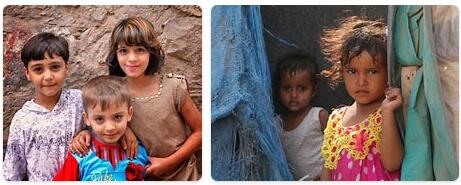Yemen is a republic with a presidential system of government, and the current president is Abdrabbuh Mansur Hadi. The country is divided into 21 governorates and the capital is Sana’a. The Yemeni government is based on a parliamentary system, with two chambers: the House of Representatives and the Shura Council. The House of Representatives consists of 301 members elected by popular vote for four-year terms. The Shura Council has 111 members appointed by the President. The political parties in Yemen are mainly divided along sectarian lines, with some parties representing specific regions or tribes. Visit COUNTRYAAH for a list of countries that start with letter Y.
The main political parties in Yemen are the General People’s Congress (GPC), Islah Party, Al-Haq Party, Yemeni Congregation for Reform (Al-Islah), and Nasserite Unionist People’s Organisation (NUPO). These five parties make up the majority in parliament but there are also many smaller parties that have representation in parliament as well. All major political decisions in Yemen require consensus among these five major parties before they can be approved by parliament. Political tensions between these major players have been high since 2011 when a civil war broke out between forces loyal to President Hadi and Houthi rebels who had taken control of parts of northern Yemen. In 2018 a United Nations sponsored ceasefire was reached to end hostilities between Houthi rebels and government forces, although sporadic violence still continues today.
Yearbook 2016
Yemen. The ceasefire and the peace talks that started in Switzerland in December collapsed in early January. The civil war continued between Shiite Muslim Hire Rebels and the government side, which had the support of an alliance of countries led by Saudi Arabia, with great civilian suffering as a result. The alliance that carried out air strikes against the rebels was accused of systematically targeting the civilian population. Warnings from both the UN and human rights organizations came that, among other things, the use of cluster bombs could constitute war crimes. The current population of Yemen is 29,825,975. There were also accusations that civilians were deliberately starved.

In March, more than 100 people, most of them civilians, were killed in an airstrike against a marketplace in Mastaba in northwestern Yemen. The attack was one of the bloodiest to date during the war, which then lasted for a year.
After several months of diplomatic efforts by UN envoy Ismail Ould Cheikh Ahmed, a new ceasefire was signed in April, and new peace talks began in Kuwait. Negotiations were carried out in rounds, without any major progress, at the same time as the ceasefire was only partially held. At the beginning of August, the talks broke down completely and the air strikes resumed after a three-month delay. The fighting gradually escalated and there was great concern that the conflict would spread in the region, partly because of recurring Huthi attacks in Saudi Arabia.
Since bombs hit a hospital in the country’s rebel-controlled northwestern part, Doctors Without Borders announced in August that its staff would leave six hospitals in Yemen. The relief organization accused the Saudi-led alliance of indiscriminate air strikes. A study showed that over a third of air strikes hit civilian targets such as hospitals, schools and mosques.
The Huthis conducted several attacks against foreign vessels in the strategically important Bab al-Mandab Strait between Aden Bay and the Red Sea. A ship from the United Arab Emirates met in early October. According to the Emirates, it was a civilian ship with auxiliary broadcasts on board, while the Houthis claimed it was a warship. Subsequently, robots were also fired at an American fighter, which however was not hit. As a result, for the first time, the US military fired directly at the health-controlled area, knocking out three radar stations. For several years, the United States had used drones to strike al-Qaeda in southern Yemen.
According to thereligionfaqs, a Saudi air raid against a funeral in the capital Sana in October claimed the lives of about 150 people and injured over 500. Among the dead, many were from the country’s political and economic elite. The attack was condemned by Saudi Arabia’s allies, and the UN Secretary-General demanded an investigation. The Alliance regretted the incident and stated that a mistake had been made.
On October 22, a new ceasefire was launched, the sixth since March 2015, following pressure from the US, the EU and the UN. It enabled supplies of supplies to millions of people in need for three days. However, hopes that the ceasefire would be extended and run further came to shame.
Towards the end of the year, the rebels still controlled most of western Yemen, including the coast towards the Red Sea and the capital Sana. Around 14 million people – more than half the population – suffered acute food shortages. Of the 10,000 people who were estimated to have been killed in the war, around 4,000 were civilians.
Yemen agreed
In 2000, 17 US soldiers were killed in a blast attack targeting the USS Cole fighter in the port city of Aden. Behind the attack lay Islamists linked to the terror network al-Qaeda. A number of other attacks in the following years showed that al-Qaeda was able to use the regime’s lack of control to gain a foothold in the country.
Five opposition parties, among them al-Islah and the socialists, formed an alliance against the GPC in 2005 called the Joint Assembly parties (Ahzab al-Liqa al-Mushtarak). In 2009, the Alliance succeeded in pushing for the impending parliamentary elections to be postponed until 2011, pending a reformed electoral system. When hostile demonstrations erupted in Yemen in early 2011, inspired by the Tunisian and Egyptian uprisings (see Arab Spring), President Saleh withdrew a planned constitutional amendment and promised to resign when the mandate expires in 2013. The parliamentary elections are postponed, now on indefinitely. However, the protests continued and in November 2011 Saleh signed an agreement to surrender the government power to his vice president in exchange for judicial immunity for himself and his family.